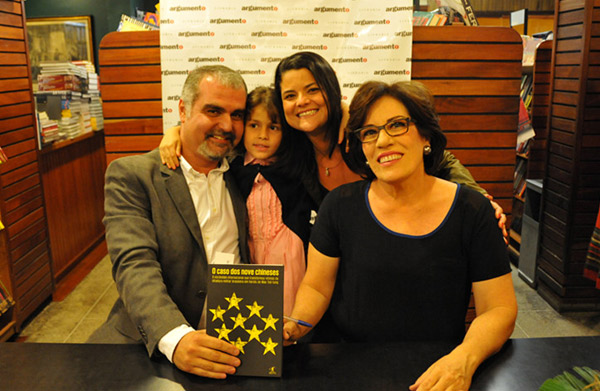After 50 years, justice at last?
 |
|
Brazilian journalists Ciça Guedes (right) and Murilo Fiúza de Melo (left) with Melo's family members at the launch ceremony of their new book The Case of the Nine Chinese Men on Aug 5 in Rio de Janeiro. Chen Weihua / Xinhua |
New book revisits forgotten case of nine Chinese jailed by Brazil junta
In April of 1964, just a few days after the coup that took down President Joao Goulart and installed a military junta in Brazil, nine Chinese citizens legally residing in the country were arrested, accused of being foreign spies plotting to start a communist revolution in Brazil.
The nine men were held incommunicado for 39 days until a local lawyer, Heraclito Fontoura Sobral Pinto, decided to take up their case pro bono. They remained in prison for the rest of the year, suffering torture and the appalling conditions of the Brazilian prison system, and were eventually tried and sentenced to 10 years in prison. Sobral Pinto appealed the convictions.
A few months later, all nine men were expelled from Brazil and sent back to China, where they received a heroes' welcome. Diplomatic talks between Brazil and China were interrupted and would not be resumed until 1974, when the two countries established diplomatic ties.
The incident marked the first international scandal of human rights violations involving Brazil's military dictatorship, which lasted more than two decades. Even after establishing diplomatic relations, Brazil never apologized to China or returned the money seized from the nine men at the time of their imprisonment — which amounts to more than $360,360 in today's dollars.
The story of the nine Chinese citizens unjustly jailed in Brazil remained mostly forgotten until now, 50 years later, when it has gained new life through the words of Brazilian journalists Ciça Guedes and Murilo Fiúza de Melo. Their new book, The Case of the Nine Chinese Men, was published on Aug 5 in Rio de Janeiro.
In an exclusive interview, Guedes and Melo said they discovered the story by chance last year while working on research related to China. Sometime later, interviewing former Chinese ambassador to Brazil Chen Duqing, the incident came up and the two journalists decided the case deserved deeper investigation. Thus the book was born.
The two authors decided the story needed to be written, and started working without having a publishing house in sight. The whole writing process was quick, taking only seven months, Guedes said. They later managed to secure a deal with local Objetiva house to publish the book this year — the 50th anniversary of the military coup (and of the arrests) and the 40th anniversary of the establishment of diplomatic relations between Brazil and China.
At the time of the arrests, China managed to garner the support of a number of countries for the release of the Chinese prisoners. The nine accused — two Xinhua journalists, four men involved in setting up a fair for Chinese products and three cotton traders — had come to Brazil as part of a trade mission that followed the visit of Brazilian President Joao Goulart to China in 1961. In a frenzy of anti-communist propaganda, their arrests were used to discredit Goulart, as his policies had led to the presence of these Chinese in Brazil.
"The most impressive thing to me was this paranoia, which turned nine innocent men into terrible conspirators who wanted to turn Brazil into a communist republic," Melo said.
With worldwide pressure over the case increasing, the Brazilian military decided to deport the nine men before judging the appeal made by defense attorney Sobral Pinto. Since the second trial never took place, the money seized from the accused was never returned and their innocence never established in court.
Though the story has been forgotten in Brazil until now, things may change. The National Truth Commission — a committee set up to investigate human rights violations committed by the military regime — is currently reviewing the case and will include it in its final report, which will be presented to President Dilma Rousseff in December.
That may result in official action to settle the case — a matter that, according to Melo, has always been in Brazil's hands.
"China will never demand anything from Brazil," he said. "Brazil must take the initiative to deal with this, by apologizing."
For China Daily
Contact the writer at readers@chinadailyusa.com


















